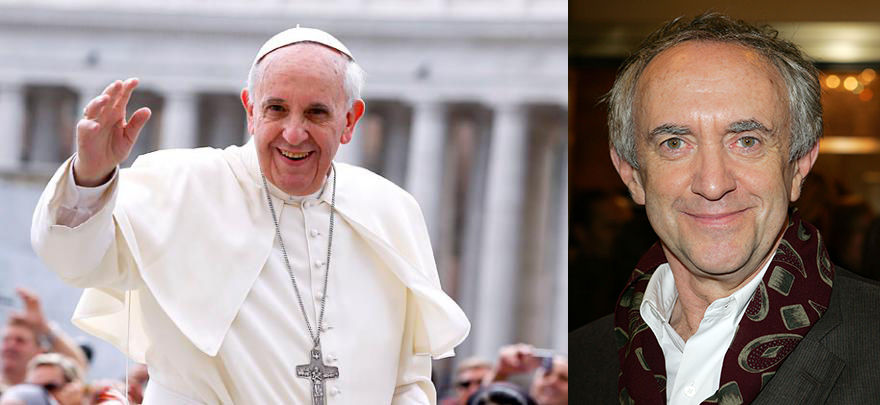I just saw the casting news: Jonathan Pryce is to play Pope Francis in an upcoming biopic. While I try to manage expectations and disappointment over any pop culture rendering of a pope’s life, I do like the casting. Price is a good actor, but given our culture’s limited, throwaway attention span, many people are only going to know Pryce as the oafish colonial governor in the first two “Pirates of the Caribbean” movies. It was a little disheartening to see this very good actor reduced to the part of playing buffoonish, cowardly and sometimes prudish father figures that have populated so many Disney films and television shows for the past generation-and-a-half, but I guess the money was good and who could blame him.
I also have more than a little trepidation about what tenor or point of view a biopic of Pope Francis is going to take, especially one that will also feature Anthony Hopkins as Benedict XVI. I hope they don’t have fava beans in this one. I’ll take Pope Francis’ advice — “Who am I to judge?” … for now. But I can’t promise I won’t have an opinion or two when this film finally sees the light of day or the dark of a movie theater.
Frankly, I’m not holding out a lot of hope. Biography is so difficult to pull off in long-form television or motion pictures. I find it hard to suspend my disbelief and trust that, given the tenor of our times and the personal biases and prejudices of the producers, writers and directors, that something negative won’t bubble up to the surface. Even the best intentions could render Pope Francis a mere caricature. We can blame iconic golden age Hollywood director John Ford. He memorialized the premise of “when the legend becomes fact … print the legend.” Ford did that in many films, like his version of the shootout at the OK Corral and Wyatt Earp in the classic western “My Darling Clementine.” That movie had nothing at all to do with what really happened. The newer “Tombstone” film is a more accurate portrayal of the story, but that doesn’t diminish “My Darling Clementine” as a piece of great filmmaking.
Using real people to further a fictional narrative is nothing new. Shakespeare furnished a rather nice house in Stratford-Upon-Avon writing inaccurate parts for very historical personages, such as Henry V and Richard III. Like a Shakespeare play or a John Ford western, when the facts get in the way of the storyline, something has got to give. Mel Brooks summed this up brilliantly in his classic “The Producers” when the flamboyant and not-too bright director tells Zero Mostel and Gene Wilder that there is one thing wrong with the play they have brought him to direct. “That whole third act has got to go. … They’re losing the war!”
If I’m skeptical about the film with Pryce as Pope Francis it is because we should all be skeptical. The Church has not always received the fairest treatment from pop culture. In the 1950s, a play that showed Pope Pius XII in a very dim light — and suggested he not only didn’t do anything to save Jews in Rome during WWII, but was all-too cozy with Nazis — took hold and Pope Pius XII has had to be defended ever since. Scholarship and new information in the proceeding decades has shown the pope not only did a lot to protect the Jews he could, but may have very well organized a spy ring of German Catholics working to depose Hitler himself. Still, the public perception of this very good man and good pope remains negative to a lot of people who should know a lot better.
More recent renderings of popes in pop culture come to mind, like Jude Law’s HBO version last year, where his pope was much more Tony Soprano than St. Gregory the Great. The dogma of our secular culture lives loudly in the current batch of writers, directors and producers, so my expectations of this new venture remains skeptical.
After all, Pope Francis is probably one of the most, if not the most misquoted and half-quoted popes in history, and for a large swath of the public that gets its cultural marching orders from movies and television, this rendering of his life is going to be the one and only reference source. Maybe Pryce as Pope Francis and Hopkins as Benedict XVI will bring humanity and holiness to life (as though the two originals don’t do that already), and maybe the writer, director and producer will be objective — we can hope, but maybe we should pray as well.

